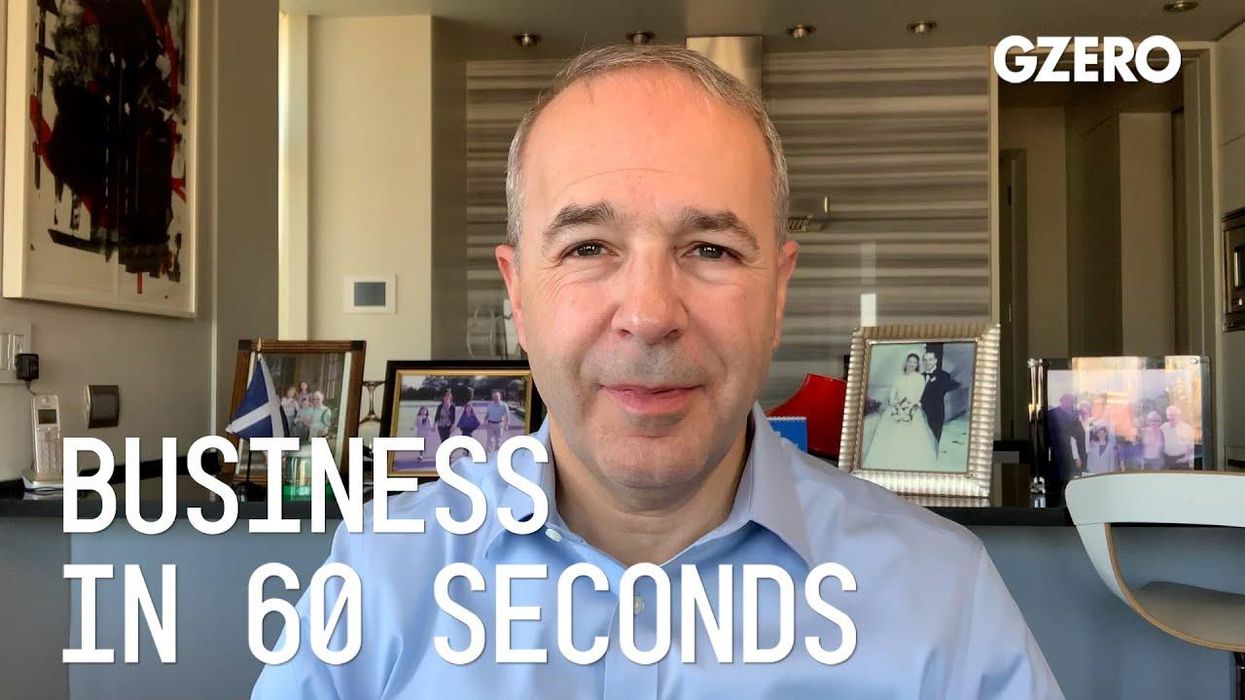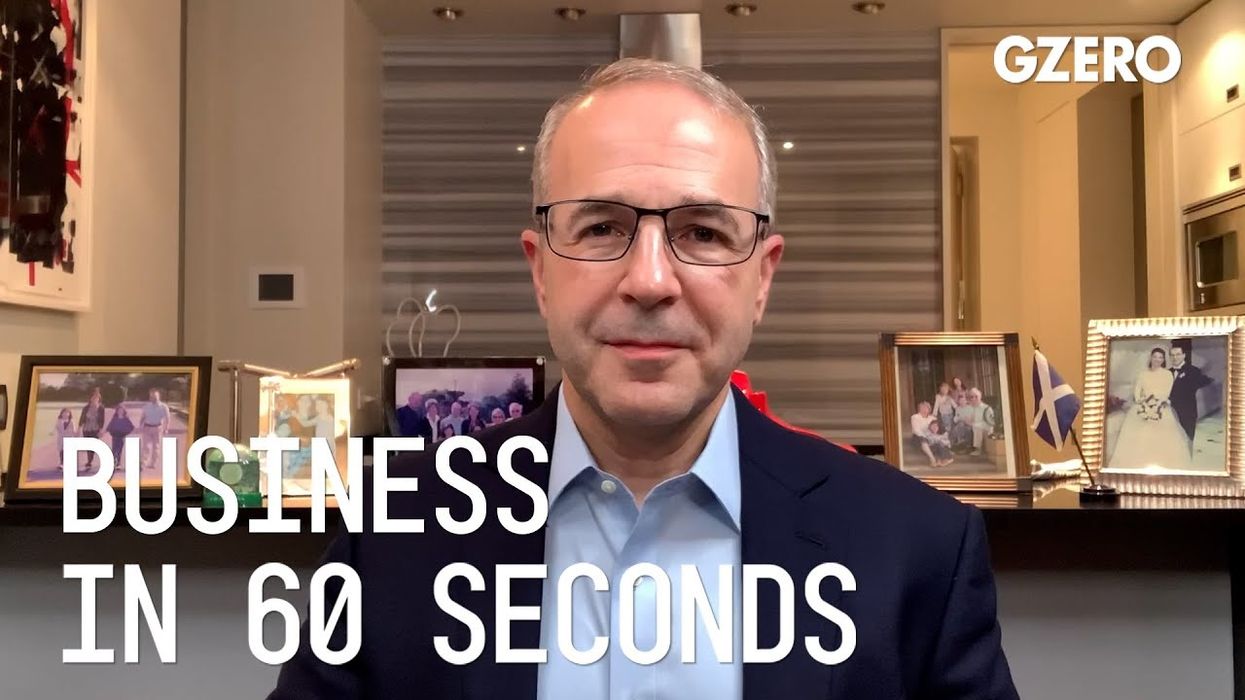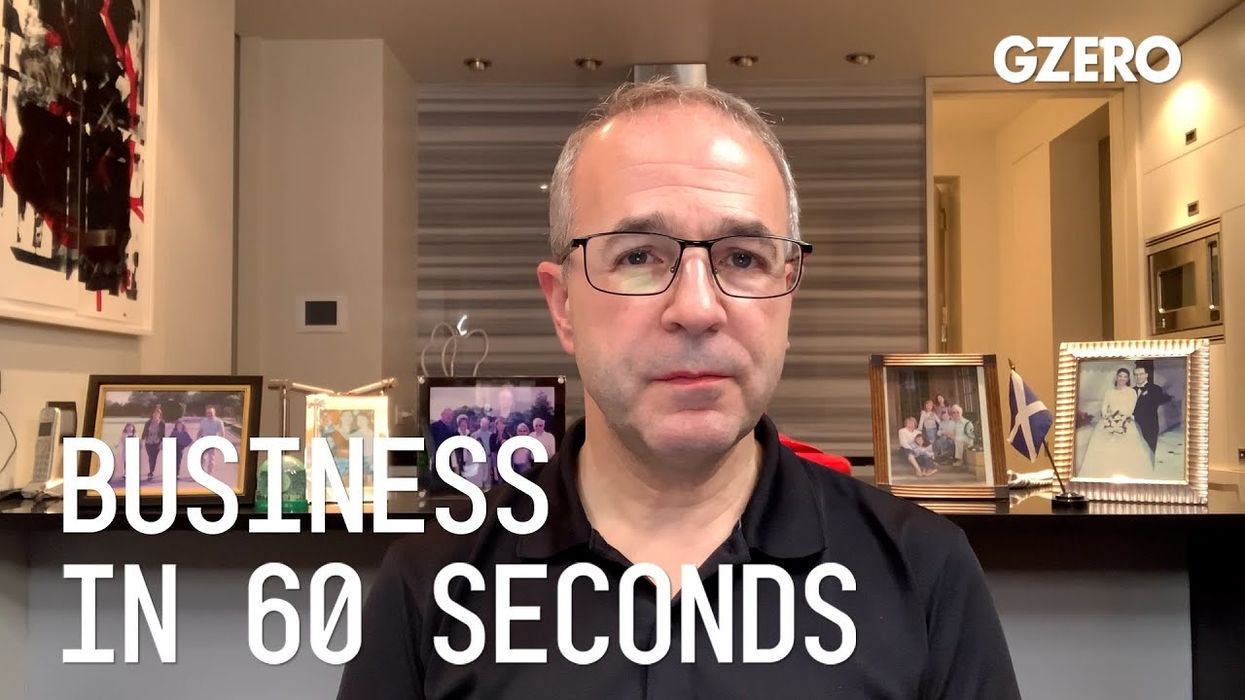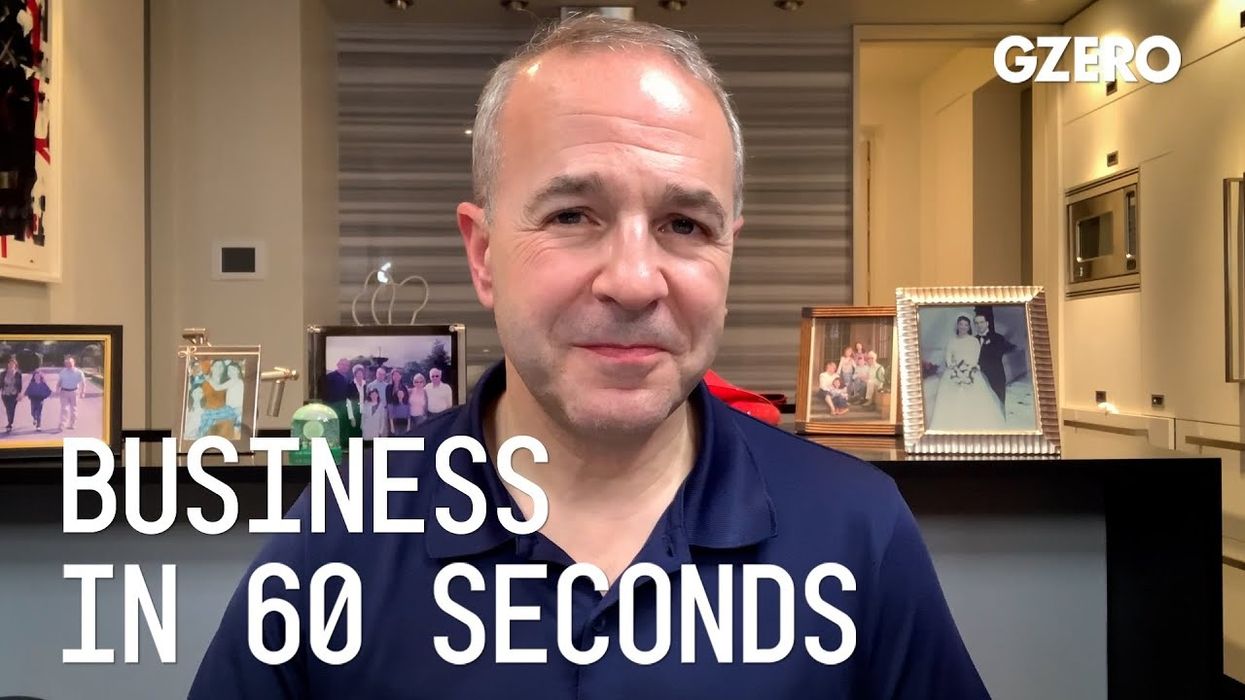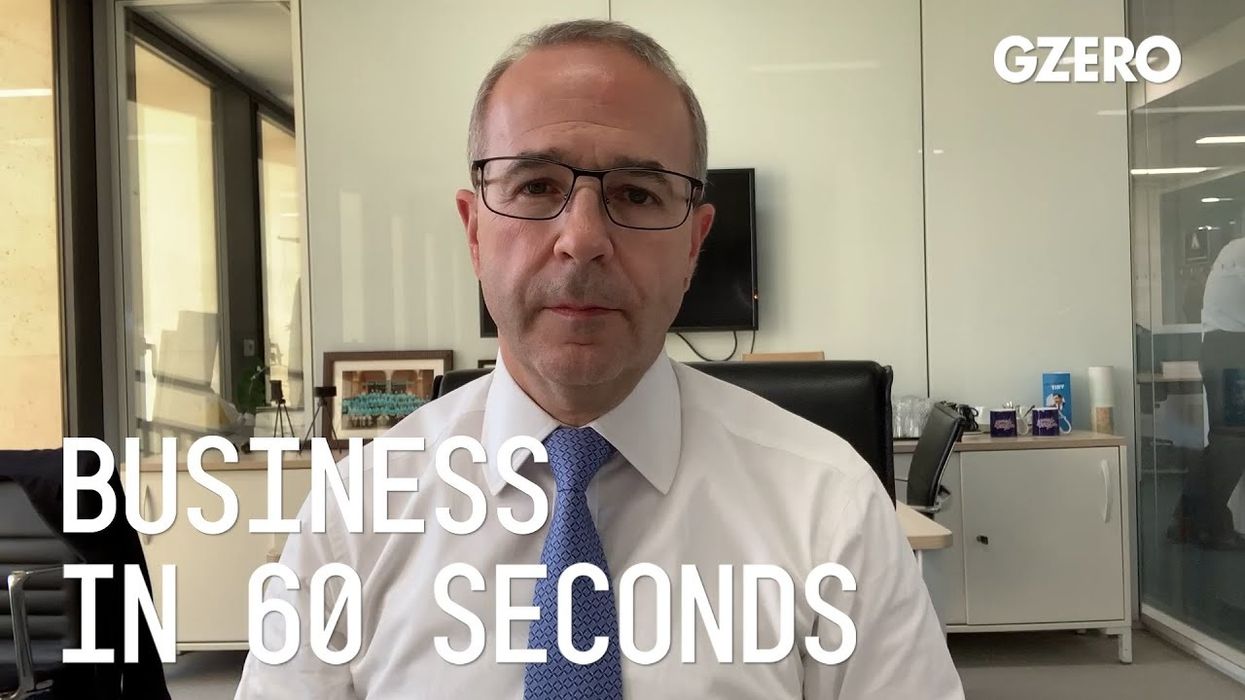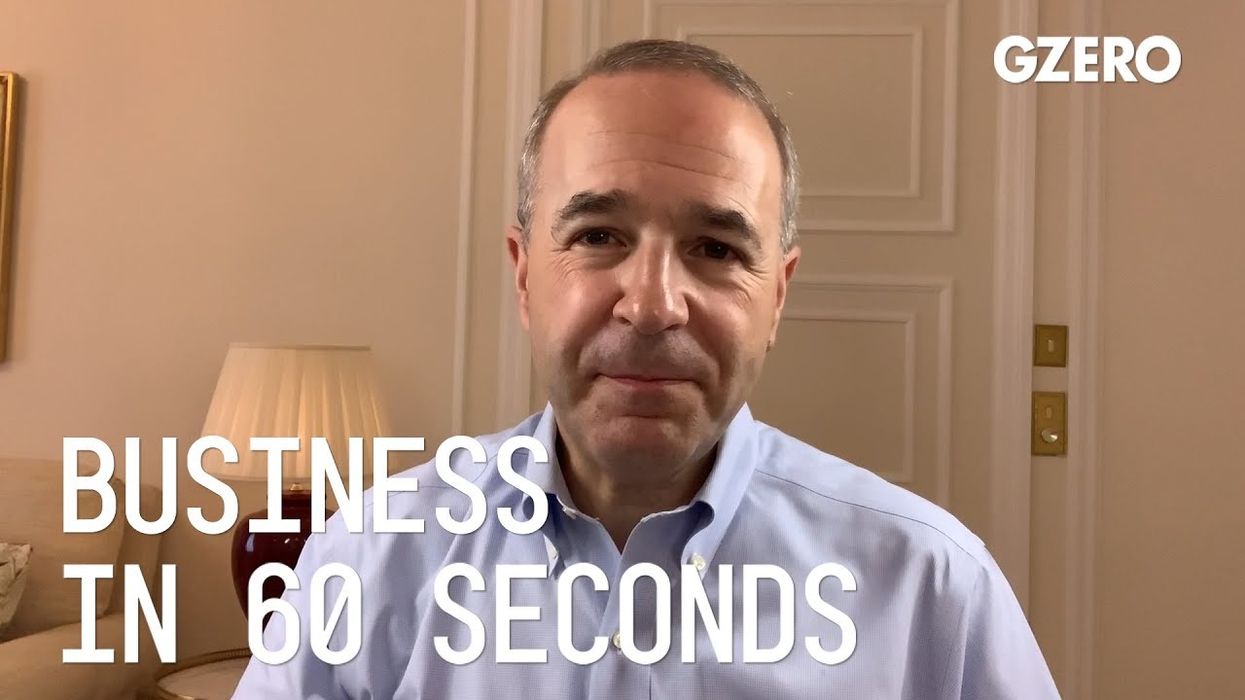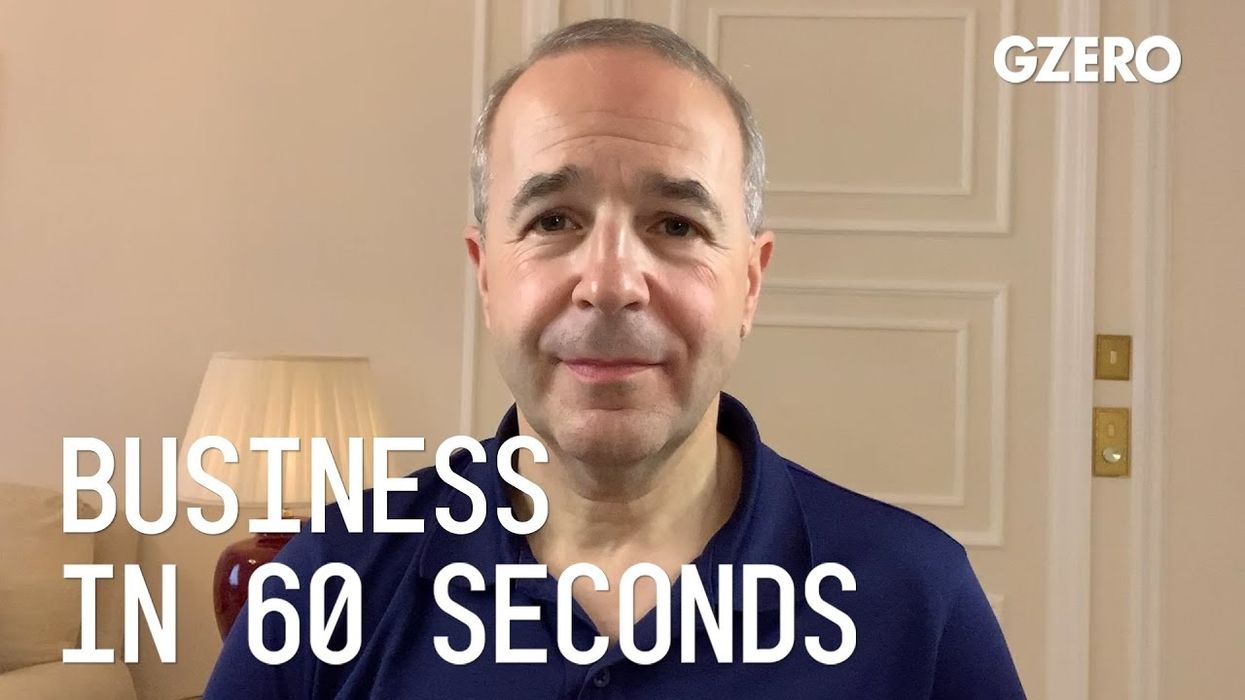Trending Now
We have updated our Privacy Policy and Terms of Use for Eurasia Group and its affiliates, including GZERO Media, to clarify the types of data we collect, how we collect it, how we use data and with whom we share data. By using our website you consent to our Terms and Conditions and Privacy Policy, including the transfer of your personal data to the United States from your country of residence, and our use of cookies described in our Cookie Policy.
Business In 60 Seconds
Kevin Sneader, Global Managing Partner at McKinsey & Company, provides perspective on what corporate business leaders are thinking during the global coronavirus crisis:
Should businesses be pessimistic or optimistic about 2021?
It's easy to be gloomy about the year ahead when faced with the realities of a cold, bleak winter in much of the world. Add to that lockdowns across Europe, surging case numbers and hospitalizations, and dreadful events in the Capitol in the US to name a few reasons for pessimism. But I think there is a case for optimism when it comes to this year. After all, it's true to say that it's always darkest before the dawn, and my conversations with business leaders suggest there are reasons to be positive by 2021.
Consider the following, yes, the vaccines are on their way, but so too is the impact of a wave of innovation. Twice the number of new business applications in the US and significant increases in new business starts in Germany, France, the UK and Japan. It's not just the digital economy that is reshaping lives, but science more generally with the impending bio revolution. And new ways of working are being accepted. Manufacturing is reviving and many sectors are seeing signs of confidence returning.
The great Anglo-Irish explorer Ernest Shackleton when faced with a life-or-death challenge of survival in the Antarctic commented, "optimism is true moral courage." It's time for some of that courage as we tackle 2021 with optimism.
Should big business care about small business in these times?
The answer is yes and for many reasons. First, small business is the lifeblood of our economies. 45% of employment in emerging countries and 70% in the OECD comes from small and medium enterprises. Moreover, these enterprises have been badly hit by the crisis. Surveys indicate as many as 50% of European small to medium enterprises feel they may not survive over 12 months. While SMEs are relying on government support, larger companies do have a role to play. After all, this includes prioritizing small business and procurement by locking in demand for multiple years, thus facilitating access to good credit, paying receivables to small business in time and where possible, ahead of schedule. Cash flow matters most when you're small. Looking out for small businesses that have lower resilience. For example, financial institutions can lend more and in doing so, ensure deeper customer relationships in the future.
Kevin Sneader, Global Managing Partner of McKinsey, looks at the challenges around a COVID-19 vaccine from the corporate business leadership perspective on Business In 60 Seconds.
What will it take to bring a COVID-19 vaccine to market?
Now, there are reasons to believe that a COVID-19 vaccine can indeed be developed faster than any other in history. For a start, the characteristics of this virus, unlike some families of viruses, coronaviruses overall have been shown to mutate at relatively low to moderate rates. Moreover, the sheer number of development efforts mean that over 275 vaccine candidates in development, with over 45 already in clinical trials. This is coupled with unprecedented access to funding, given over $17 billion has been committed to vaccine development and supply. That said, there are multiple hurdles to overcome. They start with getting the science right, including validating the platform technologies and demonstrating both safety and efficacy. But let's not forget that we also need enough capacity to manufacture and supply in place to reach patient populations now, and over time. And last, but by no means least, people need to be willing to be vaccinated. In the US in May, 72% of Americans said they would get vaccinated. That number has fallen to 51% in September.
Kevin Sneader, Global Managing Partner at McKinsey & Company, provides perspective on what corporate business leaders are thinking during the global coronavirus crisis:
What are the opportunities and threats on the horizon for 2021?
Now, given the pandemic is still raging, it's hard to narrow the threats and opportunities down, but here are three threats and three opportunities. One, a growing likelihood of increased inequality on several fronts. Gender, since a quarter of women in work we recently did with LeanIn.org were either contemplating leaving or taking time out of the workforce. This reached 40% for those with young children. Race, since Black Americans have seen their jobs disappear at a far greater rate than their white counterparts. And income, since COVID deaths are 4 to 5 times higher among the unemployed and are concentrated in jobs that have been hardest hit. The second threat, mental health. The signs are increasing that this is the other side of the health threat that the virus poses. And three, the environment. They need to ensure a green rather than brown recovery at a time when money is tight.
On the opportunities, first off, flexibility in working through remote and other forms of working that are now happening. Secondly, innovation; we've seen more startups this year being started than in any year before. And lastly, the environment; for all that I said there is a risk of a brown recovery, policy makers and businesses alike in much of the world assuring they're prepared to invest behind the business case for a green recovery.
Kevin Sneader, global managing partner for McKinsey & Company, provides perspective on how corporate business leaders think in response to the coronavirus crisis:
Why is managing for the long term difficult?
Well, we know from earlier research that companies that are oriented towards long-term performance, rather than short-term targets, generate more shareholder value, create more jobs, and contribute more economic growth. But we are seeing short-term behaviors, like cutting costs to boost quarterly earnings, have become more common in the past few years. Executives say they face heavy pressure from investors, and even fellow directors, to meet quarterly targets. And recently, disruptions from COVID-19 give executives more short-term issues to deal with. Now let me be clear, short-term results do matter. They're needed to stay credible. However, trouble happens when short-termism ensures focus in quarterly earnings, which have little to do with long-term value creation. It's far more important to pursue steady improvements, and fundamentals like growth, and return on invested capital.
Kevin Sneader, global managing partner for McKinsey & Company, provides perspective on how corporate business leaders think in response to the coronavirus crisis:
How can business leaders approach budget planning for 2021 when the environment is so uncertain?
In short, I believe that the planning process for 2021 presents an opportunity to turn hard earned lessons from the COVID-19 pandemic. It's an enduring exercise that links strategy to value. Now, five steps are needed for this to happen.
First, stress test scenarios and assumptions to counter uncertainty. Two, reimagine the business from a zero base in order to determine key business drivers. Three, hold back some spending centrally, as contingency, to build flexibility and optionality into budgets. Four assign finance talent to support the highest priority areas, or topics in order to prevent burnout. Five, rethink decision-making with the explicit goal of de-biasing the planning process.Given the scale of disruption, means previously held beliefs likely no longer hold true. The past year has been full of challenges. 2021 will no doubt bring another set of challenges, but it's also a year when companies invest now behind resilience and sustainability are those that will emerge stronger, not weaker from this crisis.
Kevin Sneader, global managing partner for McKinsey & Company, provides perspective on how the pandemic has influenced climate action:
Has the pandemic helped or harmed efforts to tackle climate change?
My answer, the coronavirus holds profound lessons that can help us address climate if we make greater economic and environmental resiliency core to the recovery. It's easy to forget that before the pandemic swept the world, climate was rising on the agenda of many public and private sector leaders. Not only does climate action remains critical now and over the next decade, but investments in climate-resilient infrastructure and the transition to a lower-carbon future can drive near term job creation while increasing economic and environmental resiliency. The current pandemic provides a foretaste of what could happen in the event of a full-fledged climate crisis, with simultaneous shocks to supply and demand and disruption of supply chains. The global economy has 10 to 25 years of carbon capacity left. Moving towards a lower carbon economy presents a daunting challenge. If we choose to ignore the issue for a year or two the math becomes even more daunting. We do need to act now.
